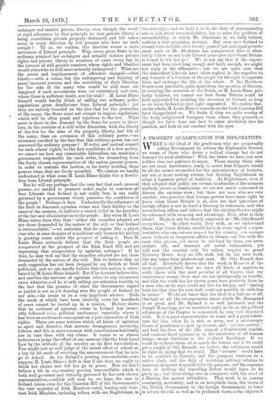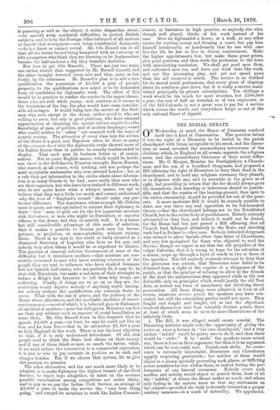A PROPERTY QUALIFICATION FOR DIPLOMATISTS.
WHAT is the ideal of the gentlemen who are perpetually asking Government to reform the Diplomatic Service, we mean of those who desire a radical change, but do not demand its total abolition ? With the latter we have just now neither time nor patience to argue. Those among them who are not mere doctrinaires, ready to assert that litigants would be all the sooner reconciled for the non-existence of lawyers, are not at heart seeking reform, but desiring Englishmen to adopt a Japanese policy of isolation. As Englishmen, even if they adopted that policy, are certain to abandon it the moment anybody arrests a countryman, we are not much concerned to discuss the extreme view ; but there are men who are very sensible, who perceive that foreign powers have some right to know what Great Britain is at, who see that ignorance of foreign affairs is not in itself a blessing to statesmen, and who nevertheless affirm and believe that the existing Service might be reformed with economy and advantage. Now, what is their ideal ? Might it not be shortly expressed as "Mr. Odo Russell everywhere." In other words, they wish, as we understand them, that Great Britain should have in every capital a repre- sentative who can enforce respect for his country, can manage most delicate or dangerous affairs in silence, can live with the men who govern, yet never be subdued by them, can accu- mulate, sift, and transmit all useful information, yet will cost the country only his salary, require no grand Embassy House, keep no idle staff, but do his own work, like any other busy professional man. Mr. Odo Russell does all that. Everybody knows that the work in Rome is of the most important kind, that we have all kinds of matters to settle there with the most peculiar of all Courts, that our countrymen swarm there and are not unfrequently in trouble, and that the work has for eleven years been perfectly done by a man who, as he says, could not live for his pay, and "having been for that time his own staff, could not possibly do with less in future." We do not know that the ideal is a bad one at all. One-half of all the arrangements about which Mr. Hammond is so great, and Mr. Ryland is so well informed, and the Joseph Hutuelings are so exercised could, as far as the political advantage of the Empire is concerned, be very well dispensed with. It is a good representative we want, and a good substi- tute for him when he is sick or away, not a microscopic Court of gentlemen to post up returns, and "go into society," and lead the lives of the idle class of a Continental capital, and contract fixed opinions as to the inferiority of all human beings except Parisians to the civilized Londoner. If we could do without them all so much the better, and if we could get a supply of Odo Russells, we believe the reformers would be right in saying that we could. The "returns" would have to be confided to Consuls, and the passport business to a native clerk, and the duty of watching military reforms to amateurs or agents despatched for the purpose, and the supreme duty of inviting the travelling Briton would have to be given up ; but those things are, as compared with the work of a Mission, the merest trivialities. That work is to convey constantly, accurately, and in an acceptable form, the views of tha British Government to the foreign Government, to learn in return its real as well as its professed views,—the objects it
is pursuing as well as the objects it writes despatches about, — to smooth away accidental difficulties, to protect British subjects, and to keep the Foreign Office informed of all matters of import that newspapers—not being confidential documents — do not know or cannot reveal. Mr. Odo Russell can do all
that all the better for not being hampered with an entourage of idle youngsters who think they are learning to be Ambassadors because for half-an-hour a day they translate statistics.
But how to get Odo Russells. There are just two ways, one rather hinted than suggested by Mr. Russell himself, and the other brought forward every now and then, more or less feebly, by the reformers. Mr. Russell's plan is to add a new qualification, the possession of £1,000 a year of private property, to the qualifications now asked or to be demanded from all candidates for diplomatic work. The effect of this would be in practice to confine the service to the upper classes, those who are rich while young ; and, contrary as it seems to the tendencies of the day, the plan would have some consider- able advantages. It would bring into the service of the State men who now, except in the Army, rather avoid it, who are willing to serve, but only in good positions, who have unusual opportunities of obtaining the special culture required,—the knowledge of men, of politics, and of modern languages,—and who would neither be " taken " nor annoyed with the ways of courtly society. The attraction of every class into the service of the State is a good, and Napoleon when he drew so many
of the jeunesse dorie into the diplomatic ranks showed more of his Italian finesse than in polities he usually condescended to
display. That such men do business better is, of course, untrue. Not to quote English names, which would be invidi- ous, there is the well-known Prussian example, Baron Bunsen, who started, at all events, with nothing, and was perhaps the most acceptable ambassador who ever entered London ; but as a rule they get information in the circles where alone informa- tion is at many Courts to be had, more easily than men who are their superiors, but who have been trained to different work, who do not quite know what a whisper means, are apt to believe what they see a little too much, and cannot understand
why the form of "England's errand" should make any par- ticular difference. The Americans, whose example Mr. Cobden
used to quote, are very apt indeed to entrust their diplomacy to
their " best " men, to pick out for the few important missions rich litterateurs, or men who might be Presidents, or superior
officers in the Army, and they do notably well. It is a minor but still considerable advantage of this mode of selection, that it makes it possible to dismiss such men for incom- petence, or prejudice, or unacceptability, without ruining them. There is no man in the world so badly situated as a dismissed Secretary of Legation who lives on his pay, and nobody very often whom it would be so expedient to dismiss.
The practice of removal relieves Government of some of the difficulty, but it introduces another,—that missions are con- stantly entrusted to men who know nothing whatever of the people they are sent to influence, who have studied Germans but not Spanish half-castes, who are perfectly fit, it may be, to deal with Presidents, but make a sad mess of their attempts to induce a King's last favourite to tell them why troops are collecting. Finally, if things are to go on as they are, the restriction would deprive nobody of anything worth having, for nobody without the qualification can seriously desire to serve. What with the rise of prices, and the jealousy of the House about allowances, and the inevitable abolition of secret- service money,—most of which, it is believed, goes in diplomacy of one kind or another,—none but full-grown Ministers can live
on their pay without such an amount of social humiliation as sours them. Mr. Odo Russell hints in this despatch that he spends £2,000 a year,—at least, he says he could not live on
less, and he does live,—that is, he subscribes £1,400 a year to help England do her work. There is not the least objection to that, if it is only understood beforehand. Of old, rich people used to think the State had claims on their money, and if any of them think so now, so much the better, while, if we must reduce the transaction to a commercial expression,
it is just as wise to pay servants in position as in cash, and cheaper besides. But if we choose that system, let us give the position we promise. The other alternative, and the one much more likely to be adopted, is to make diplomacy the highest branch of the Civil Service, to reject boys altogether, to insist on the severest possible examination among competitors not under thirty, and to pay as we pay the Indian Civil Service, an average of £2,000 a year, to make the service the "very best thing going," and compel its members to work like Indian Commis- sioners, or barristers in -high practice, or anybody else who, though well placed, thinks of his work instead of his ease. Give no diplomatist a house, or a staff, or any other excuse for wasting money and forming a court, but pay him himself handsomely, so handsomely that he can with care live the life he has to live in decent contentment. Make the higher appointments few, but make them great prizes, give good pensions, and then work the profession to the bone with unhesitating resolution. We shall get good men then, and cultivated men too, and have our work done like work, and not like interesting play, and yet not spend more than the aid received is worth. The service is so disliked for its unreal social pretensions, that every piece of claptrap about its costliness goes down, but it is really a service main- tained principally by private subscriptions. Ten shillings a week would be too much for most attaches, but £200,000 a year, the cost of half an ironclad, or of two regiments, or of the full Colonels, is not a great sum to pay for a service which covers the world, and everywhere keeps us out of the only national Court of Appeal.



































 Previous page
Previous page